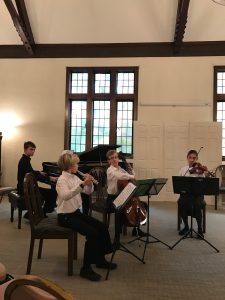The Judges
- Marlene
- Blog, choir, flute, Uncategorized
- No Comments
The Judges
Banishing Negative Self-Talk
For the first several years after I started my job as music director, I had a lot of anxiety about the job. I often came home on Sunday afternoons and cried. My husband will tell you that I would spend hours obsessing over something I said or something that I did in rehearsal that might not have come out right. My imaginary judges were constant companions.
Saturday nights were the worst. I would spend a lot of time preparing for the Sunday morning rehearsal, learning every single part. There were many sleepless Saturday nights and many anxious nightmares. The negative voices in my head were deafening. I told myself “You’re not good enough for this job. You don’t have the skills to lead a choir. The choir members don’t like you.” The judges in my head were loud and persistent.
Slowly, I came to realize that this kind of negative self talk was not making the music better. In fact, it was holding me back from joyful expression.
Now, 13 years into the job, I would like to say that the judges are completely gone, but they aren’t. I still have moments of self-doubt. But I’m learning to stare the judges in the eye, ask them to be kind, and listen to the constructive ideas they have for me.
I think most musicians are familiar with inner judges.
We must have a certain amount of self-reflection to correct mistakes during practice. Because music eaves us very vulnerable when performing or working with a teacher, negative self-talk can cause performance anxiety.
A loud inner dialog takes up a lot of space in the brain. We can only remember four to seven things at once. Playing a musical instrument or singing uses a lot of bandwidth as we shift from thinking about the body to the music to the instrument. If the brain is overloaded with inner conflict, the music will suffer. There is a limit to how many things we can be doing and remembering at once.
The first step in solving any problem is to recognize what the problem is.
Notice as you go through your music practice and your day what narrative is going on inside yourself. Listen to the voice within. Are there particular things that trigger negative self-talk?
A Soprano on Her Head
In her book A Soprano on Her Head, Eloise Ristad offers ways to confront the judges. She suggests an exercise, asking us to imagine the judges as people sitting around us.
If we stand in the center of our circle. We can look around at each judge with a sense of detachment and curiosity and find out what each one is telling us. We can also take the initiative and talk back to them; we can ask them to be more supportive and just stop tyrannizing us. We can let their cold imperiousness turn the judges into ice, then let a tiny warm glow at our center intensify little by little until our judges begin to melt away….
We can lessen the power of these nagging, bothers some judges that continually defeat us and stifle are spontaneity. We aren’t doomed to constant censorship from these commentators on our every act and thought. There’s even a chance that we can come to terms with them and find the good in them.
In her book, Eloise Ristad offers many exercises for diminishing the effect of these judges, including asking them to speak kindly or taking their power away. If your inner judges are loud, I urge you to read her book and work through the exercises Ristad suggests in Chapter 2.
When you hear your judges, counteract their negativity with affirmations.
“I am good enough; I am doing enough; I am loved.”
Reflection can be a useful tool for growth, but it must be done with love and compassion.
Too much judgment holds us back from experiencing life in the moment. It keeps us frozen in the past because we are afraid of failure. Negative self-talk often causes performance anxiety for musicians and it prevents us from fully expressing ourselves artistically.
Finally, I believe that recognizing and counteracting judgmental self-talk is a kind of spiritual practice. It has helped me be happier in my career and in my personal life. But I have to keep practicing because the judges change form as I face new challenges. I try to stay aware of the voice within me, ever vigilant that my judges are fair and kind.
No comments.